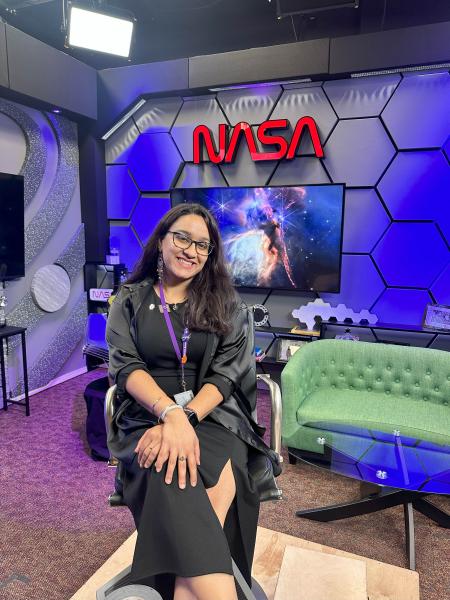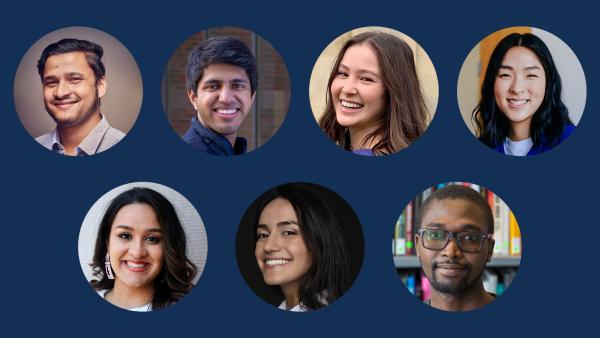Story by Ben Young Landis
One of the ways that the National Association of Science Writers supports up-and-coming talent is through our NASW Diversity Summer Fellowship. Administered by our NASW Diversity Committee, the program provides an extra financial boost for those pursuing summer internships in science journalism, writing, and communications. For the seven recipients of the 2023 NASW Diversity Summer Fellowship, the funds went a long way to support day-to-day needs and career beginnings.
- Read clips by Abdullahi Tsanni in STAT
- Read clips by Andrea Tamayo in the News & Observer
- Find Angel Kumari’s production credits at NASA Goddard
- Read clips by Bree Iskandar in STAT
- Explore a multimedia outreach page produced by Erin Connolly
- Read clips by Saugat Bolakhe in Quanta magazine
- Read clips by Simar Bajaj in STAT
One of the original intentions of the program was to help offset the expenses of moving to another city on a student’s internship salary. “Living in D.C. also meant navigating a high cost of living, and this grant was enormously helpful for defraying my housing, transportation, and grocery costs over the ten weeks that I was working in the city,” said Simar Bajaj of Harvard University, who interned at STAT in summer 2023. “I was also appreciative of the incredible community of NASW diversity summer fellows, following their pieces and progress through their own internships.”
For grantee Andrea Tamayo, now at University of California, Santa Cruz, the NASW funds provided an opportunity to finish an important piece. “Thanks to the NASW diversity award, I could stay in Raleigh for two weeks after my lease ended and finish an enterprise story — an in-depth news story that reporters unearth themselves (a term I didn’t know before the fellowship),” said Tamayo, who worked at the Raleigh News & Observer as a AAAS Mass Media Science & Engineering Fellow. “Writing this enterprise story was the most challenging feat to overcome this summer, since it sat at the intersection between science and politics — a crossroad I had never written about.”
As with any other profession, science writers lead whole lives with responsibilities at work and home — and the Diversity Summer Fellowship funding can buoy resources wherever they are most needed. Abdullahi Tsanni, who interned with STAT while completing his master’s degree in science writing at the Massachusetts Institute of Technology, can relate. “As an international student, the NASW funds served as an immense source of financial support for me, because many science writers from backgrounds like me have to depend on monthly stipends alone when in school while also supporting their families back home,” said Tsanni.
NASW’s Diversity Summer Fellowship support isn’t limited to on-site internship experiences either, given today’s flexibility of options to work remotely. Bree Iskandar, who also completed her 2023 summer internship with STAT and was also a AAAS Mass Media Fellow, used NASW funding to bridge both experiences. “I worked remotely for most of my fellowship, but I used the NASW diversity grant to fund a week-long site visit to STAT’s headquarters in Boston at the beginning of the summer,” said Iskandar, who recently completed her doctoral degree at the University of North Carolina at Chapel HIll. “This visit allowed me to organically meet much of the staff at STAT, which I relied on heavily once I transitioned to remote work. My in person visit was extremely valuable and greatly increased the quality of my overall internship experience.”
Of course, internships are a two-way street, for trainees can also contribute new perspectives and ideas to their host site. Angel Kumari, a Johns Hopkins University science writing student who interned in summer 2023 with the NASA Goddard Space Flight Center, suggested improvements that benefited her communications office as well as the media outlets they worked with. “I advocated for inclusion on the Live Shot team by ensuring that news stations correctly used scientists’ pronouns during interviews and adding a ‘name pronunciation’ line to our emails,” said Kumari. “In addition, I learned how to write image descriptions for social posts, a new skill for me. I aligned my goals with actionable steps to advance diversity and inclusion efforts throughout my internship.”
 Photo Angel Kumari during her internship with NASA Goddard (Image courtesy of Angel Kumari/NASA)
Photo Angel Kumari during her internship with NASA Goddard (Image courtesy of Angel Kumari/NASA)
At the end of the day (or summer?), supporting a trainee’s summer internship is still about growing their skills and horizons, as our 2023 NASW Diversity Summer Fellows can attest. Erin Connolly interned with the federal interagency program Conservation and Adaptation Resources Toolbox (CART) and completed science writing assignments not as traditionally published stories, but as multimedia outreach tools. “I have always been a scientist first and a writer second, so taking part in a writing-focused internship last summer felt like a risky choice,” said Connolly, who is continuing her work with CART through the National Drought Mitigation Center at the University of Nebraska-Lincoln. “The support I received through the NASW Summer Diversity Fellowship provided both financial relief and a much-needed confidence boost that the risk was worthwhile.”
For Saugat Bolakhe, a summer internship with Quanta magazine has improved his professional approach as a freelance journalist. “The magazine’s approach to selecting science news stories encouraged me to think critically about the broader implications of each pitch,” said Bolahke, who is currently completing his master’s degree with the Newmark Graduate School of Journalism at the City University of New York. “My editor and I often engaged in thoughtful discussions about how the new research advanced our fundamental understanding of a given topic. While many of my initial pitches were rejected, these experiences were incredibly instructive. As a freelancer, I now have a deeper insight into the decision-making processes on the editorial side, which has improved the quality of my pitches and my ability to frame stories effectively.”
In a difficult time for the science news industry, seeing early career writers and journalists prosper and create their beginnings offers a much-needed ray of light — and assurance of NASW grants well-spent. Leave it to an NASW Diversity Summer Fellow to encapsulate the sentiment perfectly:
“With dwindling resources across many newsrooms, including freelance budgets, which many science journalists in the global south depend on, we could face even more impacts and challenges in telling important science stories from the region,” said Abdullahi Tsanni. “But I am by no means gloomy about the future of my career and prospects of science writing. There’s a contagious hope, energy, and immense support shared among, and for young writers in the NASW community.”
 The seven recipients of the 2023 NASW Diversity Summer Fellowship. Top L-R: Saugat Bolakhe, Simar Bajaj, Erin Connolly, Bree Iskandar. Bottom L-R: Angel Kumari, Andrea Tamayo, Abdullahi Tsanni (Courtesy of CUNY Newmark; Harvard University; Erin Connolly; UNC-Chapel Hill; Angel Kumari; Misty Jones Photography; Jon Sachs)
The seven recipients of the 2023 NASW Diversity Summer Fellowship. Top L-R: Saugat Bolakhe, Simar Bajaj, Erin Connolly, Bree Iskandar. Bottom L-R: Angel Kumari, Andrea Tamayo, Abdullahi Tsanni (Courtesy of CUNY Newmark; Harvard University; Erin Connolly; UNC-Chapel Hill; Angel Kumari; Misty Jones Photography; Jon Sachs)
Ben Young Landis is the assistant executive director of NASW and also serves as its digital, print, and social media editor.
Apply for the next round of NASW Diversity Summer Fellowship grants by April 1, 2024. Find information and instructions at: https://www.nasw.org/article/nasw-science-writers-diversity-summer-fellowship-students-trainees-interns-2024-apply
NASW members interested in supporting the Summer Diversity Fellowship can volunteer to serve on the NASW Diversity Committee. To learn how, visit nasw.org/volunteer for current listings and opportunities.
Founded in 1934 with a mission to fight for the free flow of science news, NASW is an organization of ~3,000 professional journalists, authors, editors, producers, public information officers, students and people who write and produce material intended to inform the public about science, health, engineering, and technology. To learn more, visit www.nasw.org and follow NASW on LinkedIn and Bluesky. And join us in celebrating #NASW90th.




